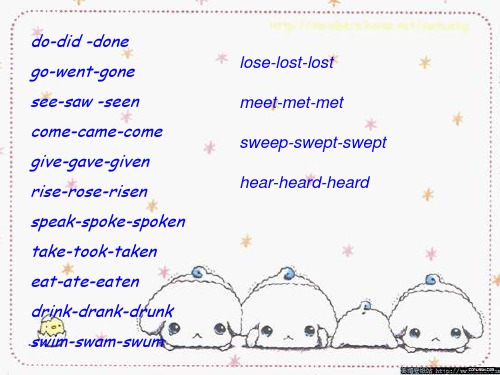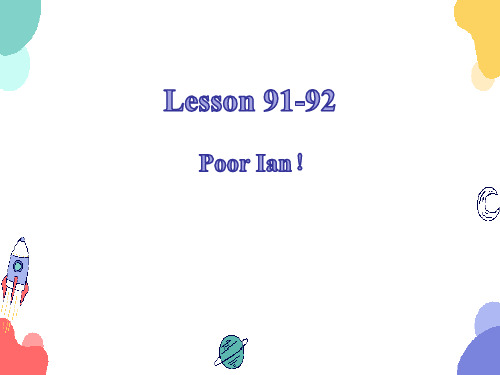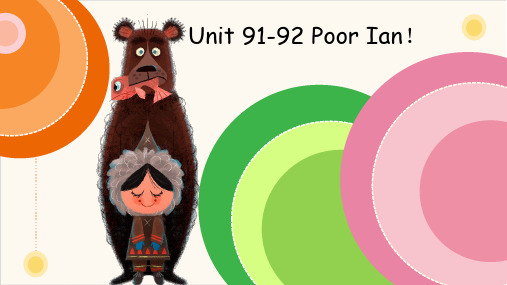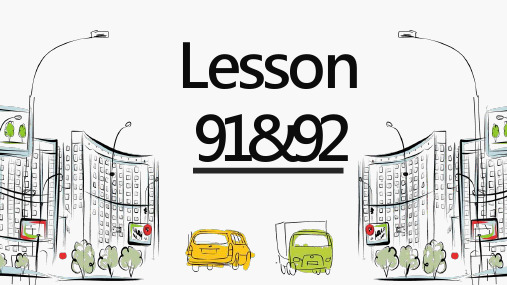新概念 英语 第一册91-92课课件
合集下载
新概念1册第91-92课课件

Lesson 91
Poor Ian 可怜的伊恩
★still
① adv. 还是,仍然 • I still can’t decide where to go. • 我还是不能决定去哪。
• She was still beautiful at the age of 46. • 她46岁时仍然美丽。 ② adv. 还要,甚至更 • She looked very ill last week and this week looks
v. 想念,思念 n. 邻居 adv. 还,仍旧 v. 搬家 n. 人 adj. 可怜的 n. 人们
来看这一组句子
He didn’t want to leave this house. No, he didn’t want to leave, but his wife did. 第二个句子是对第一个句子的证实,这里不可以
按照中文习惯去赞同别人的说法,而是要根据 事实来说,因此回答no, he didn’t want to leave. 但是翻译成中文的时候要说,是的,他 不愿意离开。 例句: He didn’t go to school last week, did he?
No, he didn’t. 是的,他没去。 Yes, he did. 不,他去了的。
do-did -done go-went-gone see-saw -seen come-came-come give-gave-given rise-rose-risen speak-spoke-spoken take-took-taken eat-ate-eaten drink-drank-drunk swim-swam-swum
lose-lost-lost meet-met-met sweep-swept-swept hear-heard-heard
新概念第一册Lesson91-92+课件

move /mu:v/ v. ① 搬家 ②移动
eg. ①They moved from Beijing to Changsha.
他们从北京搬到了长沙。 ②Don't move. 别动。
miss /mis/ v. ①想念,思念 ②错过
eg. ①We will miss you if you move. 如果你搬家了,我们会想你的。 ②We missed the bus. 我们错过了那辆公车。
6 people [pi:pəl]n.人们 7 poor [pɔ:] adj.可怜的
still /stil/ adv.还,仍旧
eg. I still want that toy! 我还是很想要那个玩具。
She was still beautifull at the age of 50. 她50岁时依然美丽。
He is seriously ill.He is going to die. He will be twenty years old.
be going to 含有“计划,准备”的意思,而 will 则没 有这个意思,如: She is going to lend us her book. He will be here in half an hour.
92课 When will...?
一般将来时时间状语
T O D AY TOMORBiblioteka OWthis morning
this afternoon
this evening
tonight
TOMORROW tomorrow morning tomorrow afternoon tomorrow evening tomorrow night
afternoon/evening
新概念英语第一册91-92课课件

• • • • • • •
-He didn’t want to leave this house. -No, he didn’t, but his wife did! 反意疑问句: -He didn’t go to school yesterday, did he? -No, he didn’t.(是的,他没去。) Yes, he did.(不,他去了。) 注意没有混搭形式:Yes, he didn’t. / No, he did.
• poor
• adj. ①可怜的 • The poor old woman had no one to talk to.
• 那个可怜的老人找不到人跟她说话。
• ②贫穷的 • a poor man
• 贫穷的人
• the poor
富裕的人
the rich
• We should help the poor.
★miss v. 想念,思念 ① v. 想念,惦念 • 我想你 • I missed you. ② v. 错过;未做到 • 他睡过了头,错过了他那班火车。 • He overslept and missed his train.
• ★person n.(强调个体,不分男女老少,有复数 persons) • The person in a hat is my father. ★people n.(强调集体,是集合名词) • How many people are there in your family? • person n. 人 He is a nice/good person. • 他是个好人。 • personaladj. 个人的,私人的
• • • • •
课文讲解
-Has he moved to his new house yet? -No, not yet. Move to 搬到… 我明天要搬到B区的办公室。 I’ll move to the office in zone B tomorrow. • Yet用于疑问句和否定句的句尾。 • No, he has not moved to his new house yet.
新概念英语第一册91 92课 完整ppt

Hale Waihona Puke eviewbelieve may how long since why sell because retire cost pound worth penny
v. 相信,认为 可以
多长
prep. 自从 adv. 为什么 v. 卖,出售 conj. 因为 v. 退休 v. 花费 n. 英镑 prep. 值……钱
all
miss
him.
CATHERINE:When will the new people move into
this
house?
JENNY:I think that they'll move in the day after tomorrow.
LINDA : Will you see Ian today, Jenny?
Welcome back!
1.Why does Nigel believe that the house is for sale? 2.How long has Ian lived there? 3.Why does Ian want to sell the house? 4.Why couldn`t Nigel decide? 5.Who has the last word in your family?
Q&A
5.Is Ian a good neighbor ? 6.Will Jenny see Ian today ? 7. Did Ian want to leave this house ? 8. Who wanted to sell this house ? 9.Will Jenny and Catherine miss Ian ?
• move to = move into 搬进。 • people = neighbours • 她是这个职位的合适人选。 • She’s the right person for this job. • 公园里有很多人。 • There’re a lot of people in the park.
新概念英语NCE_Lesson91-92(共26页)课件

Welcome back!
July27th
1.Why does Nigel believe that the house is for sale?
2.How long has Ian lived there?
3.Why does Ian want to sell the house?
4.Why couldn`t Nigel decide?
• He is sitting still. • 他一动不动地坐着。 • 病人安静地躺着。
• The patient is lying still.
• ★move v. 搬家;感动 • 这个故事感动了我。
• This story moves me. • move to 搬到……地方 • move in 搬进 • move out 搬出来 • move away 搬走 • 我们下个月将搬到乡下
lose-lost-lost meet-met-met sweep-swept-swept hear-heard-heard
Exercise:
1.Richael has already spoken to his boss.(改否定句) 2.The house cost Taylor 5000yuan.(划线提问) 3.He has had a temperature for 3hours.(划线提问) 4.The visitors came back to the airport by car.(划线 提问) 5.The boss has already left.(划线提问)
v. 退休 v. 花费
n. 英镑 prep. 值……钱 n. 便士
do-did -done go-went-gone see-saw -seen come-came-come give-gave-given rise-rose-risen speak-spoke-spoken take-took-taken eat-ate-eaten drink-drank-drunk ave you . . . yet?
July27th
1.Why does Nigel believe that the house is for sale?
2.How long has Ian lived there?
3.Why does Ian want to sell the house?
4.Why couldn`t Nigel decide?
• He is sitting still. • 他一动不动地坐着。 • 病人安静地躺着。
• The patient is lying still.
• ★move v. 搬家;感动 • 这个故事感动了我。
• This story moves me. • move to 搬到……地方 • move in 搬进 • move out 搬出来 • move away 搬走 • 我们下个月将搬到乡下
lose-lost-lost meet-met-met sweep-swept-swept hear-heard-heard
Exercise:
1.Richael has already spoken to his boss.(改否定句) 2.The house cost Taylor 5000yuan.(划线提问) 3.He has had a temperature for 3hours.(划线提问) 4.The visitors came back to the airport by car.(划线 提问) 5.The boss has already left.(划线提问)
v. 退休 v. 花费
n. 英镑 prep. 值……钱 n. 便士
do-did -done go-went-gone see-saw -seen come-came-come give-gave-given rise-rose-risen speak-spoke-spoken take-took-taken eat-ate-eaten drink-drank-drunk ave you . . . yet?
Lesson91-92课件新概念英语第一册

否定句: 主语 + won’t + 动词原形+将来时间
❌变否定
1.I will improve my writing skills. I won’t improve my writing skills.
2.He will go to the market tomorrow. He won’t go to the market tomorrow.
be going to
will do
be going to 使用的两种情况:
2.表示事先经过考虑, 安排好打算要做的事情。
如果出现计划、打算一般 都用be going to .
I am going to watch a film.
1.表示根据目前某种迹象 判断,某事非常有可能发生。
will 使用的三种情况:
It is Friday today.
It will be
Saturday tomorrow.
It will be rainy tomorrow.
adj.
She will be at home.
prep.
She will be 12 years old .
n.
be It will
rainy. 当句中没有实义动词时,我们需要在will 后加be动词,
1.表示单纯的 未来"将要", 通用各个人称.
They will go to visit the factory tomorrow.
2.表示不以人的 意志为转移的 自然发展的未 来的事。
He will be thirty years old this time next year.
3.问对方是否愿意 做某事或表示客气 地邀请或命令.
❌变否定
1.I will improve my writing skills. I won’t improve my writing skills.
2.He will go to the market tomorrow. He won’t go to the market tomorrow.
be going to
will do
be going to 使用的两种情况:
2.表示事先经过考虑, 安排好打算要做的事情。
如果出现计划、打算一般 都用be going to .
I am going to watch a film.
1.表示根据目前某种迹象 判断,某事非常有可能发生。
will 使用的三种情况:
It is Friday today.
It will be
Saturday tomorrow.
It will be rainy tomorrow.
adj.
She will be at home.
prep.
She will be 12 years old .
n.
be It will
rainy. 当句中没有实义动词时,我们需要在will 后加be动词,
1.表示单纯的 未来"将要", 通用各个人称.
They will go to visit the factory tomorrow.
2.表示不以人的 意志为转移的 自然发展的未 来的事。
He will be thirty years old this time next year.
3.问对方是否愿意 做某事或表示客气 地邀请或命令.
新概念英语第一册第91-92课ppt课件

This story moved me.
6
★neighbour
n. 邻居
neighbourhood
n.四邻,邻近地区
这一带很安静。
This is a quiet neighbourhood.
他要搬到这一带。
He is moving into the neighbourhood.
in the neighbourhood of
10
rain snow leave get up arrive finish work have a holiday drive home
have a haircut telephone me have a shave pack his bags sweep the floor paint this room repair my car
He’s still here.
将来时的时间状语
He’s going to move tomorrow.
be going to 打算做某事
25
将来时的时间状语
CATHERING: When? Tomorrow morning?
JENNY:
No. Tomorrow afternoon.
I'll miss him. 思念,想念 错过
make an appointment
11
02
Practice
12
• still • move • miss • neighbour • person • people • poor
v. 想念,思念 n. 邻居 adv. 还,仍旧 v. 搬家 n. 人 adj. 可怜的 n. 人们
13
03
Game Time
6
★neighbour
n. 邻居
neighbourhood
n.四邻,邻近地区
这一带很安静。
This is a quiet neighbourhood.
他要搬到这一带。
He is moving into the neighbourhood.
in the neighbourhood of
10
rain snow leave get up arrive finish work have a holiday drive home
have a haircut telephone me have a shave pack his bags sweep the floor paint this room repair my car
He’s still here.
将来时的时间状语
He’s going to move tomorrow.
be going to 打算做某事
25
将来时的时间状语
CATHERING: When? Tomorrow morning?
JENNY:
No. Tomorrow afternoon.
I'll miss him. 思念,想念 错过
make an appointment
11
02
Practice
12
• still • move • miss • neighbour • person • people • poor
v. 想念,思念 n. 邻居 adv. 还,仍旧 v. 搬家 n. 人 adj. 可怜的 n. 人们
13
03
Game Time
新概念英语第一册91-92课课件(共31张PPT)

He didn’t go to school, did he?
No, I’m not.
他没有去上学,是吗?
You aren’t a student, are you?
No, he didn’t.
Yes, I am.
是的, 他没去。
(不,我是一个学生。)
Yes, he did.
No, I’m not.
have a talk (with sb)=talk (with sb) 谈话(正式)
3.theatre
n. 剧场 戏院 go to the theatre
go to the movies
go to the cinema 去看电影
4.seat
n. 座位 have a seat =take a seat =sit down 就座
CATHERINE:Poor Ian! He didn't want to leave this house.
JENNY
反义疑问句
:No, he didn't want to leave, but his wife did!
You’re a student, aren’t you?
Yes, I am.
private letter 私人信件
private car 私家车
private life 私生活
public adj. 公共的 in private=privately privacy n 隐私
2.conversation
n.谈话(非正式) have a coversation (with sb ) 对话或对白
未能
I missed buying the magazine. 我未能买到那本杂志。
- 1、下载文档前请自行甄别文档内容的完整性,平台不提供额外的编辑、内容补充、找答案等附加服务。
- 2、"仅部分预览"的文档,不可在线预览部分如存在完整性等问题,可反馈申请退款(可完整预览的文档不适用该条件!)。
- 3、如文档侵犯您的权益,请联系客服反馈,我们会尽快为您处理(人工客服工作时间:9:00-18:30)。
• ……..
词汇积累:
have a haircut telephone me have a shave pack his bags sweep the floor paint this room repair my car make an appointment
rain snow leave get up arrive finish work have a holiday drive home
He's just retired. He wants to buy a small house in the country.
4.Why couldn`t Nigel decide?
Because his wife must see it first.
Now watch the video of lesson91 and answer the following questions
1. Who wanted to sell the house? Ian’s wife 2. Why does Catherine say “ poor Ian”?
Because he didn't want to leave this house. but his wife did !
原形:sell 过去 现在完成时的标志词 sold CATHERING: Has 式: Ian sold his house yet? JENNY: Yes, he has. He sold it last week. 表示过去的时间状语
将来时的时间状语
I think + that 从句。 我认为…
否定形式:I don’t think + that 从句。 我认为不…
LINDA: Please give him my regards.
give sb. my regards
替/代我问候某人。
CATHERING: Poor Ian! He didn't want to leave this house. JENNY: No, he didn't want to leave, but his wife did! 是的, 他不想离开。
JENNY: No. Tomorrow afternoon. I'll miss him. 思念,想念
错过
He has always been a good neighbour.
have / has been + 形容词 “一直都很…”
LIDA: He's a very nice person. We'll all miss him.
反义疑问句
反义疑问句
You aren’t a student, are you? Yes, I am. (不,我是一个学生。) No, I’m not. He didn’t go to school, did he?
他没有去上学,是吗?
No, he didn’t. 是的, 他没去。 Yes, he did. 不,他去了。
课文理解:
CATHERING: Has he moved to his new house yet?
JENNY: No, not yet.
He’s still here.
将来时的时间状语
He’s going to move tomorrow. be going to 打算做某事
将来时的时间状语
CATHERING: When? Tomorrow morning?
Lesson 91 Poor Ian 可怜的伊恩 Lesson 92 When will …? 什么时候要…
Review
believe may how long since why sell because retire cost pound worth penny v. 相信,认为 可以 多长 prep. 自从 adv. 为什么 v. 卖,出售 conj. 因为 v. 退休 v. 花费 n. 英镑 prep. 值……钱 n. 便士
2.The house cost Taylor 5000yuan.(划线提问)
How much does the house cost Taylor?
3.He has had a temperature for 3hours.(划线提问)
How long has he had a temperature?
根据句子意思和首字母完成单词。 Your grandfather doesn’t go to work because he’s over 60 years old. r etire You give the food or clothes or drink to others after they pay. s ell It needs some money when you want to get or buy it. c ost It is a small copper and tin coin, 100 of which make a pound. p enny
person
n. 人 He is a nice/good person.
n. ①人们 There are a lot of people in the street. 他是个好人。 街上有很多人。 in person the people 民众,人民,国民 亲自,直接的 ②民族 He will go to get the money in person.
• ★move
• • • • • • • • • • • • • • v. ①搬家;移动 move into 搬进来(强调动作,过程) move out (of) 搬出来 move away 搬走 move from…to… 从…搬到… They moved from Nanjing to Shenzhen. 他们从南京搬到深圳。 ②感动,打动 This story moved me. 这个故事感动了我。
You feel sure that ng is true or right. b elieve
• Read the whole text in pairs.
Lesson92
When will …?
• • • • • •
表示将来的时间短语: Today Tomorrow this morning tomorrow morning tomorrow afternoon this afternoon tomorrow evening this evening Tomorrow night tonight
句型操练:
When will + 主语+动词(动词短语)?
it 主语 you she rain 动词 leave finish
work
she When will you it
leave finish rain work ?
Please practice the sentence structure according to the pictures on page 187
他将亲自去取钱。
people
personal
adj. 个人的,私人的 a personal letter
person 强调的个体的人,可以有复数形式 persons people 通常是人的统称,单复数形式相同
poor
adj. ①可怜的 The poor old woman had no one to talk to. 那个可怜的老人找不到人跟她说话。 ②贫穷的 a poor man 贫穷的人 the poor穷人, the rich 富人 ③笨拙的,差劲的 be good at sth./be good at doing sth. be poor at sth./ be poor at doing sth. 不擅于…
Lesson 91
Poor Ian 可怜的伊恩
New words and expressions ★still
① adv. 还是,仍然 • I still can’t decide where to go. • 我还是不能决定去哪。 • She was still beautiful at the age of 46. • 她46岁时仍然美丽。
Review
默写下列不规则动词的过去式和过去分词
Cut Put Read set Shut
do eat come go give rise swim see take speak
转换句型
Review
1.Richael has already spoken to his boss.(改否定句)
Richael hasn’t already spoken to his boss
课文中出现的表示的句子
When will the new people move into this house? • I think that they'll move in the day after tomorrow. • Will you see Ian today, Jenny? Yes, I will.
person强调单数“一个人”
people 强调复数“许多人,人们”,为集合名 词。
person的复数
CATHERING: When will the new people move into this house?
JENNY: I think that they'll move in the day after tomorrow. LINDA: Will you see Ian today, Jenny? JENNY: Yes, I will.
Written exercises
